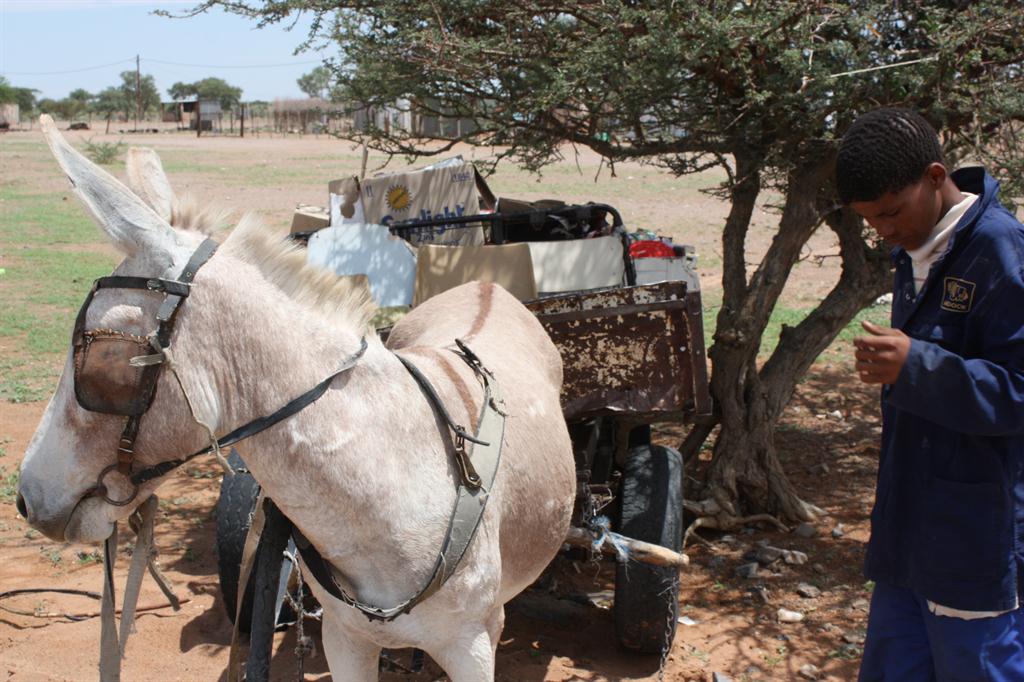Topnaars fear donkey theft
The chief of Erongo's Topnaar community says they fear losing their transport if people start stealing donkeys to sell to abattoirs.
The Topnaar community living along the Kuiseb River in the Erongo Region is concerned that proposed donkey abattoirs could lead to an increase in donkey theft.
“My people are hearing stories regarding this matter and some are concerned,” said the chief of the Topnaar Traditional Authority, Seth Kooitjie.
He told Nampa that they use donkeys for transport and sometimes sell them to those who slaughter the animals for their meat.
Kooitjie said they do not have a good understanding of the abattoirs' effect on their animals as yet.
“It might not be a bad business but if it has disastrous consequences, the government must put in place strict laws and procedures to control such businesses,” he suggested.
Kooitjie's comments follow plans by Chinese investors to establish donkey abattoirs at Outjo and Okahandja.
Each abattoir plans to slaughter at least 70 donkeys per day, which is over 25 000 donkeys per year.
There is a large market for donkey skins in Asia. The hides are used to manufacture gelatine, known in China as “e'jiao”, believed to have anti-ageing and libido-enhancing abilities.
Apart from providing transport, donkeys are also used to plough fields in Namibia. The 2016 Animal Census conducted by the Directorate of Veterinary Services indicates that there were 144 647 donkeys at the time.
Approached for comment, Outjo mayor Marius Sheya said the council would not impose the proposed abattoir on the community, especially if there was evidence that it would affect their livelihood.
Sheya said an environmental impact assessment (EIA) was under way, after which the council would consult the companies involved and the community. “The companies applied for land to establish the abattoir but it was not approved as yet; nothing will be started before all the views and the final findings of the EIA are thoroughly considered,” he said.
Okahandja mayor Congo Hindjou said the council had informed the abattoir stakeholders to consult the public first. “Our position is to bring them together with the community and hear their objections,” he said.
Kenya is the only African country with an operational donkey abattoir. Tanzania, Botswana, Uganda and Ethiopia closed their abattoirs, Alex Mayers of the British charity Donkey Sanctuary said on Saturday.
Mayers, who is in Namibia to assess the views of the public on the matter, told Nampa that donkeys represent access to clinics, water, markets and fields for people across Africa, who are often vulnerable to drought and floods. He said town councils had a great opportunity to safeguard the livelihoods of many people who depend on donkeys. “Namibia is at an interesting moment in time where strong leadership and good decision should be made before it loses a key resource,” he said.
-Nampa
PAULUS SHIKU
“My people are hearing stories regarding this matter and some are concerned,” said the chief of the Topnaar Traditional Authority, Seth Kooitjie.
He told Nampa that they use donkeys for transport and sometimes sell them to those who slaughter the animals for their meat.
Kooitjie said they do not have a good understanding of the abattoirs' effect on their animals as yet.
“It might not be a bad business but if it has disastrous consequences, the government must put in place strict laws and procedures to control such businesses,” he suggested.
Kooitjie's comments follow plans by Chinese investors to establish donkey abattoirs at Outjo and Okahandja.
Each abattoir plans to slaughter at least 70 donkeys per day, which is over 25 000 donkeys per year.
There is a large market for donkey skins in Asia. The hides are used to manufacture gelatine, known in China as “e'jiao”, believed to have anti-ageing and libido-enhancing abilities.
Apart from providing transport, donkeys are also used to plough fields in Namibia. The 2016 Animal Census conducted by the Directorate of Veterinary Services indicates that there were 144 647 donkeys at the time.
Approached for comment, Outjo mayor Marius Sheya said the council would not impose the proposed abattoir on the community, especially if there was evidence that it would affect their livelihood.
Sheya said an environmental impact assessment (EIA) was under way, after which the council would consult the companies involved and the community. “The companies applied for land to establish the abattoir but it was not approved as yet; nothing will be started before all the views and the final findings of the EIA are thoroughly considered,” he said.
Okahandja mayor Congo Hindjou said the council had informed the abattoir stakeholders to consult the public first. “Our position is to bring them together with the community and hear their objections,” he said.
Kenya is the only African country with an operational donkey abattoir. Tanzania, Botswana, Uganda and Ethiopia closed their abattoirs, Alex Mayers of the British charity Donkey Sanctuary said on Saturday.
Mayers, who is in Namibia to assess the views of the public on the matter, told Nampa that donkeys represent access to clinics, water, markets and fields for people across Africa, who are often vulnerable to drought and floods. He said town councils had a great opportunity to safeguard the livelihoods of many people who depend on donkeys. “Namibia is at an interesting moment in time where strong leadership and good decision should be made before it loses a key resource,” he said.
-Nampa
PAULUS SHIKU




Comments
Namibian Sun
No comments have been left on this article